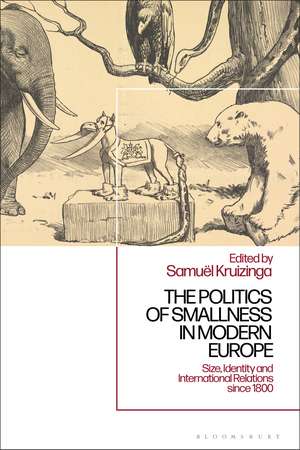The Politics of Smallness in Modern Europe: Size, Identity and International Relations since 1800
Editat de Dr Samuël Kruizingaen Limba Engleză Paperback – 18 oct 2023
| Toate formatele și edițiile | Preț | Express |
|---|---|---|
| Paperback (1) | 191.92 lei 6-8 săpt. | |
| Bloomsbury Publishing – 18 oct 2023 | 191.92 lei 6-8 săpt. | |
| Hardback (1) | 540.31 lei 6-8 săpt. | |
| Bloomsbury Publishing – 20 apr 2022 | 540.31 lei 6-8 săpt. |
Preț: 191.92 lei
Preț vechi: 249.67 lei
-23% Nou
Puncte Express: 288
Preț estimativ în valută:
36.74€ • 39.92$ • 30.88£
36.74€ • 39.92$ • 30.88£
Carte tipărită la comandă
Livrare economică 21 aprilie-05 mai
Preluare comenzi: 021 569.72.76
Specificații
ISBN-13: 9781350299917
ISBN-10: 135029991X
Pagini: 264
Ilustrații: 20 bw illus
Dimensiuni: 156 x 234 x 25 mm
Greutate: 0.37 kg
Editura: Bloomsbury Publishing
Colecția Bloomsbury Academic
Locul publicării:London, United Kingdom
ISBN-10: 135029991X
Pagini: 264
Ilustrații: 20 bw illus
Dimensiuni: 156 x 234 x 25 mm
Greutate: 0.37 kg
Editura: Bloomsbury Publishing
Colecția Bloomsbury Academic
Locul publicării:London, United Kingdom
Caracteristici
Chronological breadth stretching from the 19th century to the present day, allied to coverage of over a dozen nation-states
Notă biografică
Samuël Kruizinga is Senior Lecturer in Military and Modern History at the University of Amsterdam, the Netherlands. He recently edited, along with Ruud van Dijk, Vincent Kuitenbrouwer, and Rimko van der Maar, Shaping the International Relations of the Netherlands, 1815-2000: A Small Country on the Global Scene (2018).
Cuprins
Introduction, Samuël Kruizinga (University of Amsterdam, Netherlands)1. Belittling Spain: Hispanophobia and the Mirror Image of Greatness, Yolanda Rodríguez Pérez (University of Amsterdam, Netherlands)2. Dealing with Smallness in Hasbsburg Bohemia, Ottoman Albania and Tsarist Georgia in the late-19th and early-20th century, Adrian Brisku (Charles University, Czech Republic and University of Vienna, Austria)3. Smallness and the East-West Binary in Nationalism Studies: Belgium and Romania in the Long 19th Century, Raul Carstocea (University of Flensburg, Germany) & Maarten Van Ginderachter (University of Antwerp, Belgium)4. 'Poor Little Belgium': Food Aid and the Image of Belgian Victimhood in the United States, Marjet Brolsma & Samuël Kruizinga (both University of Amsterdam, Netherlands)5. Science, Health and American Money: Small-State Strategies in Interwar Czechoslovakia and Denmark, Elisabeth Van Meer (College of Charleston, USA), Casper Andersen (Aarhus University, Denmark) & Ludvig Goldschmidt Pedersen (Aarhus University, Denmark)6. Neutral news: Forging a Small States' Transnational Media Network, 1920 - 1940, Vincent Kuitenbrouwer (University of Amsterdam, Netherlands)7. 'Whoever Says That Serbia Is Small, Is Lying!': Serbia, Ontological (In)Security and the Unbearable Smallness of Being, Christian Axboe Nielsen (Aarhus University, Denmark)8. Iceland's Smallness: Acceptance or Denial?, Baldur Þórhallsson & Guðmundur Hálfdanarson (both University of Iceland, Iceland)10. Great Britain and Little Ireland: Reimagining British and Irish relations in BIPA, Brexit and Beyond, Sara Dybris McQuaid (Aarhus University, Denmark)11. From David to Goliath? The Question of Size in Israel's Identity Politics, Alexei Tsinovoi (Copenhagen University, Denmark)12. Conclusions and Outlook, Samuël Kruizinga (University of Amsterdam, Netherlands) & Karen Gram-Skjoldager (Aarhus University, Denmark)BibliographyGlossaryIndex
Recenzii
Finally, a full study of how small states experience and narrate their smallness. Welcome to Small State Studies, dear historians!
At a time when all attention is going towards great power competition and grand strategy, The Politics of Smallness in Modern Europe offers us food for thought on how small states in the international system have navigated the demands for autonomy and agency within challenging circumstances in the past. The book shows how indeed small can be great.
[This] book is coherent and incredibly rich. With its interdisciplinary approach, it will appeal to scholars of language, religion, nationalism, publishing, commerce, tourism and strategic communications. Still, its fundamental significance lies in endowing the study of small states with a serious research agenda (including questions of size, hierarchies, status and more). In this regard, this edited volume on smallness makes a major academic contribution.
At a time when all attention is going towards great power competition and grand strategy, The Politics of Smallness in Modern Europe offers us food for thought on how small states in the international system have navigated the demands for autonomy and agency within challenging circumstances in the past. The book shows how indeed small can be great.
[This] book is coherent and incredibly rich. With its interdisciplinary approach, it will appeal to scholars of language, religion, nationalism, publishing, commerce, tourism and strategic communications. Still, its fundamental significance lies in endowing the study of small states with a serious research agenda (including questions of size, hierarchies, status and more). In this regard, this edited volume on smallness makes a major academic contribution.
